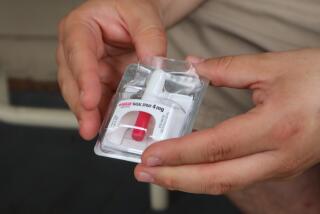L.A. County sheriff backs database on sales of cold medicine
- Share via
Reporting from Sacramento — When you buy cold medicine, Los Angeles County Sheriff Lee Baca wants to know about it.
He and other California sheriffs are hoping the state will help them learn about such purchases as part of a narcotics enforcement plan that is riling civil rights activists.
Their proposal calls for a statewide database to track Californians’ purchases of remedies such as Sudafed that contain pseudoephedrine, a key ingredient for illicit production of the drug methamphetamine.
Buyers would have to sign an electronic log and provide their date of birth and home address. The database would alert stores instantly if a customer had already purchased the legal limit of the remedy in other locations, and stores would be banned from selling it to such customers.
“It’s really a prevention tool,” said Baca, one of the law enforcement officials behind the legislation that would create a state database. “The ability of people to acquire these chemicals for illicit purposes would drop significantly.”
Officials at the ACLU say there would be other implications as well.
“Law enforcement officers could follow up with individuals after their purchase of a packet of the common congestion remedy Sudafed and grill them about why they purchased it, what their medical condition is and other private information,” said Valerie Small Navarro, a senior legislative advocate for the ACLU in California.
Other worries cited by civil liberties groups: the record of consumers’ purchases could be used for marketing by pharmaceutical companies and others or even become a Big Brother-like database used for social surveillance.
Federal law already prevents anyone except law enforcement personnel from having access to such data. Assemblyman Jerry Hill (D-San Mateo), author of the state proposal, which is still being refined, said it would similarly limit use of the information.
State law requires that pseudoephedrine products be kept behind the store counter and that buyers of certain quantities provide identification and sign a log. Retailers may not sell any customer more than three packages at a time or more than nine grams in a 30-day period.
The restrictions have helped curb methamphetamine production, according to the California State Sheriffs’ Assn., but the group says the state is not making nearly enough headway.
Certain cold tablets can be easily processed to extract pseudoephedrine, said Sgt. Keith Proctor of the San Bernardino County Sheriff’s Narcotics Division.
The LAPD reports that clandestine methamphetamine labs in Southern California have accounted for 40% to 45% of the narcotic produced in the United States. Of the 19 “superlabs” -- which produce the drug on a factory-like scale -- discovered and dismantled nationwide last year, 17 were in California, state officials said.
Nick Warner, a spokesman for the California State Sheriffs Assn., cites cases of drug dealers evading current limits on cold remedy purchases by filling cars with people and driving them from store to store loading up on the medicine, a practice known in the drug trade as “smurfing.”
“An electronic registry will help curb and prevent the number of smurfing incidences while still allowing consumers an appropriate degree of access” to ephedrine products, San Bernardino County Sheriff Rod Hoops wrote to state lawmakers.
The database legislation, AB 1455, has been endorsed by the Consumer Healthcare Products Assn. and member drug makers, including Johnson & Johnson, and some drugstore chains, such as Rite Aid.
Oklahoma, Arkansas and Kentucky have state databases. In Kentucky, clerks have blocked hundreds of improper purchases, nearly 2% of the total, and led law enforcement officials to several meth labs, said Andrew Fish, general counsel of the Consumer Healthcare Products Assn., a national trade group.
The organization’s members manufacture and distribute over-the-counter medicines and would pay for the system, but the data would be administered by the National Assn. of Drug Diversion Investigators. That private, nonprofit group works with the pharmaceutical industry to improve prevention and investigation of the illegal use of medicine.
ACLU officials say such systems will not catch most people who want to get around it, and will encourage meth makers to engage in identity theft to get the cold medicine.
“The question is: Are you achieving a goal that warrants infringing on people’s medical privacy?” Navarro said.
patrick.mcgreevy
@latimes.com
More to Read
Sign up for Essential California
The most important California stories and recommendations in your inbox every morning.
You may occasionally receive promotional content from the Los Angeles Times.











